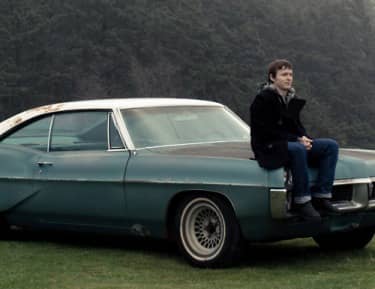
Blue Like Jazz is one of the key books in the Emergent/Emerging/Emerged canon. I haven't read it, but it has been recommended to me by friends. I have, however, seen the recent film adaptation, and the verdict is...I didn't hate it. In fact it had plenty going for it - likeable characters, a decent portrayal of that new-world-of-college experience where you stumble upon friends and try new things, and -- if Portlandia is to be believed -- a fairly accurate depiction of the quirk-fest that is Portland, Oregon.
The story is that of Donald Miller, a southern baptist living in Texas who experiences the hypocrisy of Christians first-hand and decides to leave it all behind -- his home, his family and friends, his identity -- in order to create a new self in a strange place, filled with lesbians and atheists. Not much of those in southern baptist circles, I imagine. (For the record, Donald Miller does not transform himself into a lesbian atheist called Donna Ditchkins, but if there are any film makers reading this, I think I've spotted a gap in the market.)
There is also this girl -- of course there is -- and it is Miller's relationship with her vis-a-vis his relationship with God and the Church that forms the spine of the film. If the previous sentence made you sigh, rest assured, it's not quite what you fear. Of course the film has problems. As much as Southern Baptists might deserve it [I once asked a lecturer in college what the difference was between the American Baptist Association and the Southern Baptist Convention, and his answer was "Thought"] they are probably justifiably angry at being portrayed solely as hypocritical, fundamentalist nutjobs. Which feeds into the second problem, namely, the lack of Miller the Southern Baptist. His new life in Portland would have been much more affecting and intriguing if we had seen more of his old life in Texas. Other than Don's hair becoming a little cooler, it wasn't quite clear what changes occurred in Reed College. Or should I say, the changes were assumed changes rather than manifest. For example, we assume Miller wasn't the kind of person who let a lesbian sleep beside him in his bed, but we don't fully know, therefore the moment loses force. Finally, there was a few too many "here's a random, funny incident from college that may or may not help with the telling of this story" moments for my liking.
Still, I came in a little sceptical, but came out wanting to read Blue Like Jazz. Since the book is almost always better than the film, then I may just have to dip into the Emergent/Emerging/Emerged canon once more. *sigh* (ps - Is that a closed canon?)
Declan although many evangelicals see this book as one of the emerging/emergent/emerged cannon its not. Don Milleris is your average evangelical guy not reformed yet not emergent/ing/ed. And the story didn't look more in depth to Dons life cause it was a bit of a biography of real Don after written not long after he eft reed college. Funny thing is that the book is an adaptation from real life that it's adapted to a movie.
ReplyDeleteWhile Miller didn't identify as "emergent", I don't think I'm stretching things to say that Blue Like Jazz was very much at home in that "conversation" when it came out. So it's part of the canon even though it's written by an "outsider", which is very emergent indeed! (except of course they would never use the term outsider or insider, but I don't have to tell you that Mr Pete Rollins lover!)
ReplyDeleteps - looking forward to seeing you soon, assuming this is the Juan that I know.